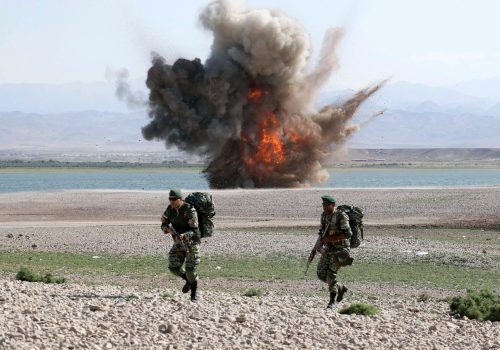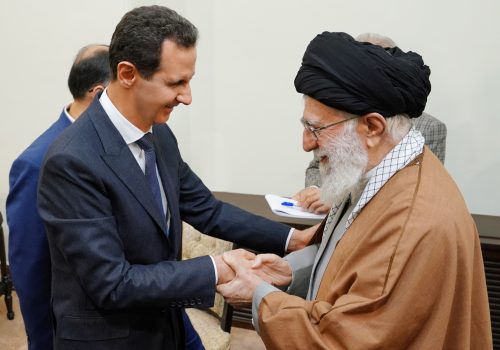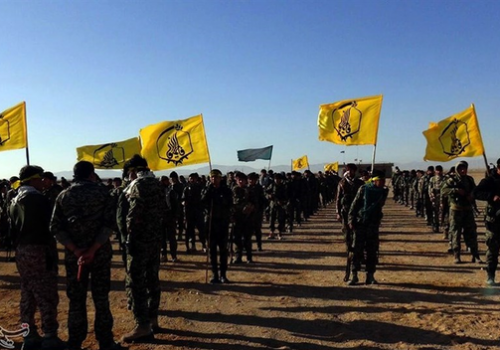Iran’s Middle East influence may actually be declining
The foreign policy of the Islamic Republic of Iran is going through tough times. Growing global dissatisfaction with Tehran’s approach to its nuclear program and delays in returning to the negotiations, as well as developments in Iran’s backyard, are undermining Iranian claims to successful “resistance” and rising influence.
Since Ebrahim Raisi won the June 18 presidential election and took office in August, his administration has constantly stressed close relations with neighboring countries as a top priority. Raisi even when as far as to name Hossein Amirabdollahian as foreign minister, whose expertise is limited to Middle East affairs.
Addressing parliament to receive his vote of confidence, Amirabdollahian, who had previously served as deputy foreign minister for Arab and African Affairs, repeatedly emphasized that the region would be a priority. “We in West Asia seek to institutionalize the on the ground achievements of the Resistance,” he said on July 22, referring to Iranian ties to groups such as Lebanese militant group Hezbollah and Iraqi Shia militias.
Despite the minister’s bravado, recent developments in the Middle East have not been in Tehran’s favor.
Iran’s closest ally, Hezbollah, has been blamed for a variety of Lebanon’s ills, including the massive Beirut port blast in August 2020. Its members were involved in recent armed clashes on October 14 that broke out during protests against a judge investigating the port disaster. Although Hezbollah denies involvement in the violence, many Lebanese, who have been protesting in the streets for more than two years, want an end to Iran’s intervention in their country’s affairs. Increasingly, there is concern that a new civil war could erupt.
In Afghanistan, meanwhile, the Taliban—a historic Iranian foe—have returned to power, leading to concerns over the fate of Afghan Shias, who have been the targets of attacks by the local Islamic State of Iraq and al-Sham group, ISIS-K. In Iraq, parliamentary elections in October were a setback for Iran-backed Shia groups, with Sadrists led by Shia cleric Muqtada al-Sadr, an Iraqi nationalist, winning the most seats. Independent candidates and political currents that arose after months of protests in Iraqi streets in 2020 won dozens of seats. It’s also worth mentioning that the elections recorded the lowest turnout since the US invasion that led to the creation of a new Shia-dominated political system.
Increasingly, Iraq seeks to play an independent role and become a balancing force between Iran and Saudi Arabia—something that may diminish Tehran’s clout. During the closing ceremony of a recent Baghdad summit on August 28 that drew together a number of regional rivals, Amirabdollahian sparked controversy by standing in the front row reserved for heads of state for a group photo. The image of him between Emirati Prime Minister Sheikh Mohammed bin Rashid Al Maktoum and Egyptian President Abdel Fattah al-Sisi, broke diplomatic protocol and intensified skepticism about the Islamic Republic’s intentions toward Arab states.
Arab countries have long complained about the role of militias and other groups created and nurtured by the Islamic Revolutionary Guards Corps’ Quds Force. The new Iranian foreign minister is well known for his close ties to the Quds Force and his appointment, intended to show Iran’s regional focus, in fact intensified the anger and grievances of Arab states about the Islamic Republic’s interference.
On the plus side for Tehran are talks that began under Raisi’s predecessor between Iran and Saudi Arabia. Normalization of relations would be an important achievement for the Raisi government. Both Iran and Saudi Arabia have paid a high price for the past six years of tensions. Saudi Arabia is tired of the prolonged war in Yemen and uncertain about US support while Iran is having trouble supporting proxies while US sanctions remain in place.
A Saudi-Iran détente would not change the trend lines, however. Developments in Iran’s northern and northwestern borders are not in the country’s favor. Border tensions between Iran and Azerbaijan sparked a serious political war of words. The holding of an October military exercise by the Iranian army near the border with the Republic of Azerbaijan was soon followed by Baku’s joint drills with Turkey and another shared drill with Turkey and Pakistan.
On October 17, Azerbaijani leader Ilham Aliyev lashed out at Iranian officials in a short video. Wearing a military uniform, he said, “Do not make us angry. Calm down. If you say something about us in the media again, we will walk over your heads. No one in the world is on your side.”
Turkish President Recep Tayyip Erdogan further mocked Iran. “I do not expect the recent events to result in a military confrontation between Iran and Azerbaijan, because on the one side, Azerbaijan has relations with Israel and on the other side, Iran take into account the sizeable Azeri population inside,” he said on October 21.
Tehran’s regional problems are embedded in broader difficulties. It cannot expect to succeed in the neighborhood without resolving barriers to trade and investment, which include Iran’s failure to enact financial transparency measures required by the Financial Action Task Force, (FATF) and continuing US secondary sanctions.
While Iran has said that it will return to nuclear talks on November 29, the long delay in negotiations has caused dissatisfaction among even Iran’s friends, such as Russia and China. On October 23, Mikhail Ulyanov, Russia’s representative to international organizations, expressed his dissatisfaction on Twitter with Iran’s delay in returning to talks.
Meanwhile, officials in the previous Hassan Rouhani government stress that China, despite its continued indirect purchase of Iranian oil, will not be able to increase trade and investment without Iran ratifying the FATF-related legislation.,
Therefore, contrary to the argument pushed by the Raisi government, Iran will not be able to significantly improve relations with regional countries without resolving its global problems. If Tehran continues to balk at resolving its differences with the US over returning to compliance with the Joint Comprehensive Plan of Action, for example, even Iranian friends could further turn their backs on the Islamic Republic.
Saeid Jafari is a Middle East analyst based in Europe. He has written for various outlets including Foreign Policy, Al-Monitor, Middle East Eye. Follow him on Twitter: @jafariysaeid.
Further reading
Fri, Oct 8, 2021
Iranian war games on the border with Azerbaijan were really a message to Israel
IranSource By
The high self-confidence of Azerbaijani authorities today, the coldness of Tehran-Yerevan ties due to Iran’s support of Baku during the Nagoro-Karabakh conflict, and the growing influence of Turkey and Israel in the Caucasus have made Iranian officials concerned about the possibility of a limited conflict in the region.
Wed, Sep 30, 2020
Examining Tehran’s regional strategy
IranSource By
Neither the Obama administration’s successful negotiation of the 2015 multilateral Iran nuclear agreement nor the Trump administration’s unilateral withdrawal from the JCPOA and re-imposition of sanctions appear to have dented or retarded Iran’s advancement of its regional goals.
Fri, Jul 26, 2019
Under US sanctions, Iran regional influence grows
IranSource By
All US secondary sanctions on Iran’s core economic sectors were re-imposed by the Trump administration in November 2018 as a direct consequence of its withdrawal from the Joint Comprehensive Plan of Action (JCPOA).
Image: Hossein Salami (R), commander-in-chief of the Islamic Revolutionary Guard Corps (IRGC) gestures while speaking during a ceremony to mark the anniversary of the seizure of the U.S. embassy in downtown Tehran, November 4, 2021. (Photo by Morteza Nikoubazl/NurPhoto)


